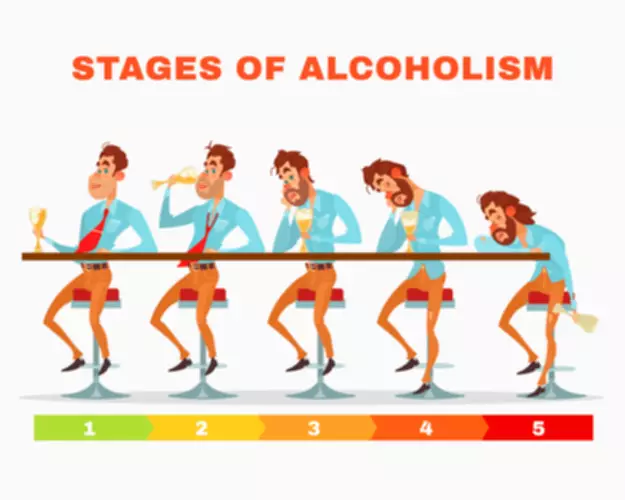Your Guide to the Stages of Alcohol Recovery

Many people addicted to alcohol also turn to 12-step programs like Alcoholics Anonymous (AA). There are also other support groups that don’t follow the 12-step model, such as SMART Recovery and Sober Recovery. The challenge of this stage is to essentially develop and maintain healthy life skills that will serve you for a lifetime. An exciting part of this period is that it can lead you to a happier life full of welcomed change and constant improvement. This stage typically starts 3–5 years after you’ve stopped drinking.
- The goal is to change the thought processes that lead to alcohol misuse and to develop the skills necessary to cope with everyday situations that might trigger alcohol misuse.
- This is because alcohol is a costly habit, so giving it up can free up some extra cash.
- But maybe you’re unsure about quitting completely and don’t want to hold yourself to that goal.
- Most people benefit from regular checkups with a treatment provider.
- Ultimately, receiving treatment can improve your chances of success.
Types of Health Care Providers
For example, antidepressants, if someone with an alcohol addiction were self-medicating to treat their depression. Or a doctor could prescribe drugs to assist with other emotions common in recovery. If you think you may have a drinking problem, you’re definitely not alone. In 2021, researchers estimated nearly 30 million people ages 12 years and older in the United States had alcohol use disorder (AUD). It can be helpful to make a plan ahead of time for how to handle a relapse.

Withdrawal treatment
People struggling with AUD may also feel severe symptoms which can be dangerous. Ask friends or family to check on you throughout the detox process. Aside from providing emotional support, they can also call medical professionals if something goes wrong. Alcohol withdrawal symptoms can be painful and potentially life-threatening, so it’s important to have people you can rely on. Alcohol withdrawal syndrome is a clinical diagnosis that relies heavily on the history and physical, which is also used to gauge disease severity.
- A doctor might also recommend certain dietary changes or supplements, such as vitamins B-1 (thiamin) and B-9 (folic acid), to help the body cope with the decreasing alcohol intake.
- After half a year without drinking, you will really start to reap the rewards.
- Multiple factors can affect how long it may take you to withdraw from alcohol.
Alcohol Withdrawal: How to Get Through It
After 24 hours without alcohol, your body will start to detoxify and you may experience withdrawal symptoms. Contact your primary care provider, health insurance plan, local health department, or employee assistance program for information about specialty treatment. If you have any of these symptoms, alcohol may Alcohol Detox already be a cause for concern. A health care provider can look at the number, pattern, and severity of symptoms to see whether AUD is present and help you decide the best course of action. Many people with alcohol use disorder hesitate to get treatment because they don’t recognize that they have a problem.
- A rare but very serious syndrome called delirium tremens can occur during alcohol withdrawal.
- Another benefit of giving up alcohol is that your mind may be clearer.
- The abstinence stage typically begins right after you stop drinking.
- You might notice this effect more if you were drinking to manage your mood, such as drinking to temporarily relieve negative emotions or boost positive ones.
- Following successful completion of detox, an inpatient or outpatient rehabilitation program may be recommended to allow further work toward recovery and relapse prevention.
Alcohol Withdrawal Syndrome

Making alcohol difficult to access can help you avoid temptation and increase the chances of a successful detox. Acceptance- and mindfulness-based interventions increase awareness and acceptance of present-moment experiences. Mindfulness-based skill-building strategies promote flexible, rather than autopilot, responses to triggers that can prompt drinking. 12-step facilitation therapy is an engagement strategy used in counseling sessions to increase an individual’s active involvement in 12-step-based mutual-support groups. Professionally led treatments include behavioral treatments and medications.

Our facilities offer evidence-based treatment, several alumni programs for continuing care in your recovery journey, and a 90-day brand promise. This means that if you complete 90 consecutive days at an AAC facility and experience a relapse after graduation, you are welcome back for a complimentary 30 days of treatment. Outpatient alcohol detox may be a good fit for people at low risk for severe withdrawal. Withdrawal progress is monitored through frequent check-up appointments within outpatient clinical settings (e.g., doctor’s office), allowing for the level of care to be escalated if needed. For most people, alcohol withdrawal symptoms will begin sometime in the first eight hours after their final drink.
If you are concerned about potential alcohol withdrawal symptoms, talk to your doctor. A doctor can evaluate your overall health and alcohol abuse history to https://ecosoberhouse.com/ help you determine how likely it is that you’ll experience symptoms. They can recommend treatment options that can help, including therapy and medications.
What Causes Alcohol Withdrawal Symptoms?
- However, when you stop drinking, your liver will begin to repair itself and the damage will start to reverse.
- It’s important to not enable destructive behaviors and to maintain appropriate boundaries if the person with the alcohol addiction is still drinking.
- Given its spectrum of manifestations from mild to severe and potentially fatal, all healthcare team members must recognize the signs and symptoms of this condition.
- Alcohol-related problems—which result from drinking too much, too fast, or too often—are among the most significant public health issues in the United States.
Your provider may also be able to suggest an online self-guided program. Such e-health tools have been shown to help people overcome alcohol problems. Your health care provider can help you evaluate the pros and cons of each treatment setting. Cognitive–behavioral therapy can take place one-on-one with a therapist or in small groups. This form of therapy is focused on identifying the feelings and situations (called “cues”) that contribute to heavy drinking and managing stress that can lead to a return to drinking. The goal is to change the thought processes that lead to alcohol misuse and to develop the skills necessary to cope with everyday situations that might trigger alcohol misuse.

What happens to your body when you stop drinking?
Seeking professional help can prevent a return to drinking—behavioral therapies can help people develop skills to avoid and overcome triggers, such as stress, that might lead to drinking. Most people benefit from regular checkups with a treatment provider. Medications can also deter drinking during times when individuals may be at greater risk for a return to drinking (e.g., divorce, death of a family member). When seeking professional help, it is important that you feel respected and understood and that you trust the person, group, or organization to help you. However, remember that relationships with health care providers can take time to develop.

Leave a Reply
Want to join the discussion?Feel free to contribute!